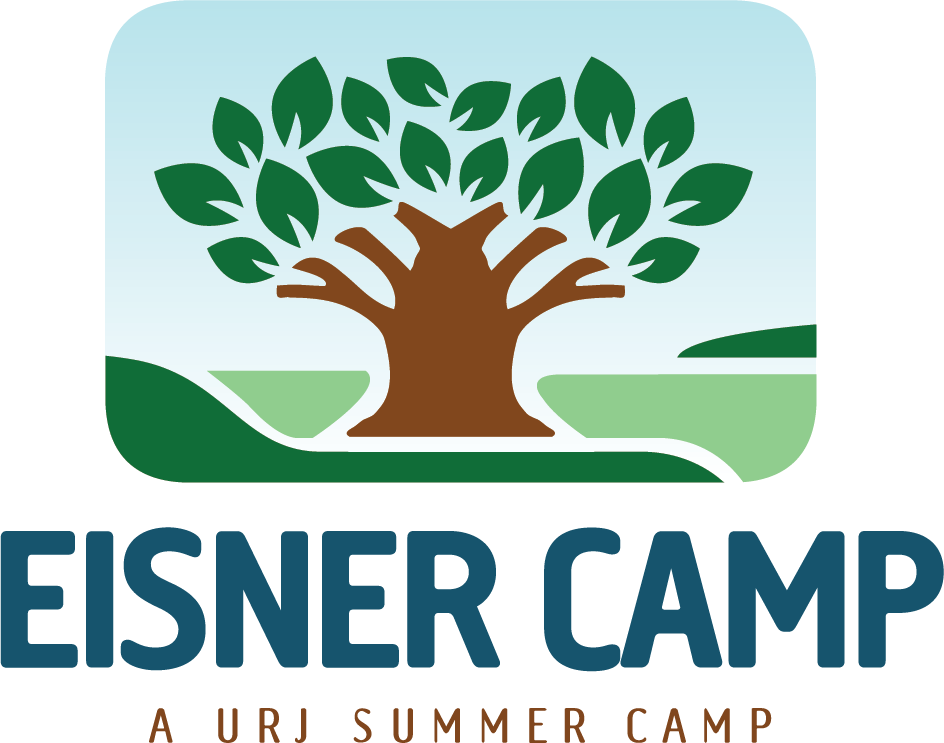by Rabbi Herman Blumberg, alum
What would groups of Eisner campers, ages seven to thirteen, want to talk about with a few elderly visitors who attended the camp before their parents were born?
The sessions on this lovely Berkshire summer Sunday morning were billed as an opportunity to find out what life was like in Eisner Camp’s first years (i.e. “Rishonim”). We were the antiquated resource: Paula, my wife, having been a counselor in 1958 and 1959; I worked here as student rabbi in ‘59.
Much to our surprise the kids came armed with two pages of questions and were really interested.
First question: “What kind of food did you have?”
“Mung,” Paula responded, and started to launch into a description of the gelatin-laden pudding so viscous that you could turn the bowl upside down and the gooey mixture would not fall out. “We had that for our supper last night,” the kids responded with glee and amazement as more than sixty years of age difference melted away. “We used to hold the bowl over our counselor’s heads to see if it was really thick enough,” Paula continued. The young people knew that camp trick from their own experience!
For close to an hour we were peppered with questions: What kind of sports did you have? Where did you live? (In chicken coops!) Did you swim in the lake or the pool? (We had no pool!) Did you know about Gertrude the ghost? Were you ever in the Manor House basement? How many kids were in your bunk? Did you have Israeli dancing, or arts and crafts?
The kids listened with curiosity, interest, amusement and, at times, a sense of disbelief that their experiences today and ours way back in history were both similar and so very different. For us, contrasting how primitive the physical facilities were in those early years with the magnificent campus today was heartwarming and gratifying. And realizing how rich the children’s camp experience is today compared with the modest programs of those first years was inspiring.
At one point we changed roles – we became the interviewers. ”Tell us, what is your favorite activity?” The question unlocked a floodgate of responses. The kids talked about the programs they liked from the ropes course to song session, from watersports to Shabbat services, from ‘Rib Night’ to breira (free time). Clearly, they are having fun each day.
But it was the next cluster of questions that elicited the most special responses: “What do you like about Eisner? What makes it special for you?”
- “This is a place where I can be myself.”
- “There is no competition here and no pressure.”
- “Everyone is kind and helpful; no one is left out.”
- “I have the opportunity to get to know someone who, at first glance, I think I wouldn’t like.”
- “We can’t have cell phones here so I talk to the people around me and get to be friends with them.”
- “Services here are better than at home.”
 The answers validated the efforts of Louis Bordman and his staff to create a unique camp experience shaped at every turn by Jewish values. These are kids happy to spend time in a Jewish atmosphere, growing in their humanity and Jewish identity seamlessly. We know that the chances of their living Jewish lives as adults, affiliating with synagogue and becoming its leaders and raising their kids within the Jewish world are heightened significantly.
The answers validated the efforts of Louis Bordman and his staff to create a unique camp experience shaped at every turn by Jewish values. These are kids happy to spend time in a Jewish atmosphere, growing in their humanity and Jewish identity seamlessly. We know that the chances of their living Jewish lives as adults, affiliating with synagogue and becoming its leaders and raising their kids within the Jewish world are heightened significantly.
We, together with fellow Rishonim, left Eisner that day fulfilled and with a sense of awe. Our embryonic experience 58 years ago, made possible by a group of visionary Reform Jewish lay leaders and rabbis, has grown deep roots and, from year, flowers with precious fruit.
Chazak, Chazak, V’nitzchazak – may the entire camp community (past and present) go from strength to strength.
-Paula and Herman Blumberg
* Rishonim: Alumni from the first few years of the camp, we gathered from Florida and Michigan, western New York, the Berkshires and Boston
